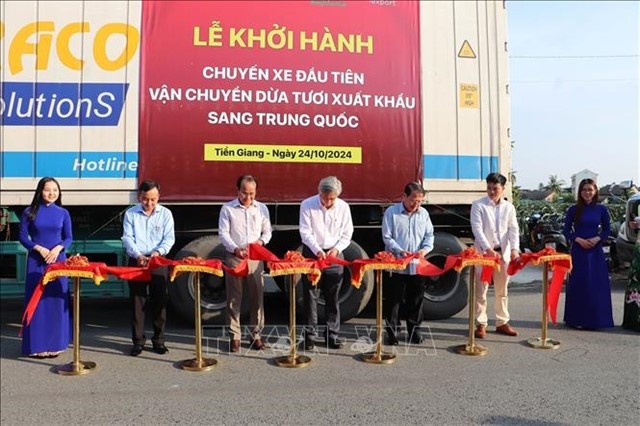Tiền Giang is also a province with a large coconut growing area in the Mekong Delta region with more than 20,650 hectares, an annual output of about 234,000 tonnes.

The Department of Industry and Trade of the Mekong Delta province of Tiền Giang has coordinated with FADO iExport Corporation to organise the official export of the first batch of nearly 70 tonnes of fresh coconuts to China on Thursday.
Deputy chairman of the provincial People's Committee Phạm Văn Trọng said that this was an important event for the locality in its efforts to promote trade and boost the export of key fruit products to foreign markets, especially the Chinese market.
Trọng shared that Tiền Giang is a province with a large coconut growing area in the Mekong Delta region that is constantly expanding. Coconuts are currently grown on more than 20,650 hectares with an annual output of about 234,000 tonnes.
In recent years, Tiền Giang has seen many preferential mechanisms and new methods to promote coconut growing and processing activities in the province, he said.
The locality will continue to replicate good models and to promote the strong development of the local coconut industry, help farmers improve their income and businesses to produce and do business effectively, contributing to the goal of turning Vietnamese coconut trees into billion-dollar export crops in the near future, said Trọng.
Phạm Tấn Đạt, chairman of the Board of Directors at FADO, noted that the Regional Comprehensive Economic Partnership (RCEP) has paved the way for Việt Nam to export 15 types of agricultural products directly to China.
Fresh coconut, recently approved for official import, is the latest addition to this list. Prior to this, Vietnamese coconut had already gained a foothold in over 15 countries worldwide.
This shipment marks the first time fresh Vietnamese coconuts have been transported deep into China by rail. This innovative method offers numerous advantages, including faster customs clearance, avoidance of congested border checkpoints, and more competitive transport costs compared to traditional road shipping. — VNS





